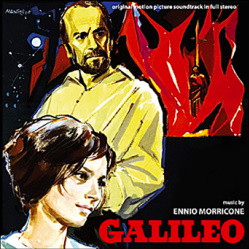主页--->m-comment-000--->mb-comment-006-67
|
电脑版 |
|||||||||||||||||
布罗克斯顿评说莫里康内 MB-006-67 |
||||||||||||||||||
FA6809 Galileo / Galileo
Galilei / 伽利略传 |
||||||||||||||||||
作者 乔纳森·布罗克斯顿 (Jonathan Broxton) |
||||||||||||||||||
ENNIO MORRICONE 评论,第6部分 006-67 |
||||||||||||||||||
 |
||||||||||||||||||
《伽利略》是一部由莉莉安娜·卡瓦尼执导的意大利传记片,讲述了著名天文学家和科学家伽利略·伽利莱的生平,特别关注了他多年来与天主教会的冲突,即他用新发明的望远镜解释他的天文观测结果,该望远镜假设地球围绕太阳旋转,而不是相反——这在 1610 年代被认为是深刻的异端和有争议的。这部电影由爱尔兰演员西里尔·库萨克饰演伽利略,格奥尔基·卡洛扬切夫饰演伽利略的朋友和导师佐丹奴·布鲁诺,皮耶罗·维达饰演教皇乌尔班八世。 “伽利略”被认为是莫里康内最具戏剧性的教会音乐,他使用一个大型管弦乐队和一个气势磅礴的男声合唱团来承担天主教会的重量。合唱团宽广、开放的发音确实非常壮观,莫里康内在丰富的铜管、敲击乐和尖锐的钢琴和弦乐的灵巧支持下编排它们的方式令人印象深刻。“Galileo Nel Circo”和结论性提示“Galileo”可能是这种风格的最好例子。 在其他地方,莫里康内营造了一种诡异、神秘的氛围,似乎沉浸在中世纪的教堂音乐和普通歌曲中,使用教堂管风琴、钟声和人声,以及一些相当前卫的弦乐和圆号写作;在这方面,“Sogno Primo”、“Sogno Secondo”和“Sogno Terzo”等提示令人印象深刻。此外,莫里康内还创作了“新”中世纪赞美诗“Eresia Defunta Sia”的几个场景,该歌曲以导演莉莉安娜·卡瓦尼(Liliana Cavani)的新词为特色,并以从浪漫到神秘的各种方式进行改编。 《伽利略》是一首具有挑战性的乐谱,但我个人很欣赏它,因为它与那个时期的其他莫里康内乐谱有着明显的不同——古典主义、对中世纪教堂音乐的引用和摘录,以及对前卫写作风格的坚持,与意大利面条西部片和流行舞曲的律动相去甚远。多年来,该乐谱已多次发行——通常与莫里康内 1970 年的配乐 I Cannibali 配对——但这个版本由 Digitmovies 于 2014 年发行,是从原始立体声母带重新制作的,包括六首以前未发行的曲目由作曲家本人批准。 曲目列表: 1. Lunare Primo (1:37), 2.Eresia defunta Sia (1:43), 3.Sogno Primo (1:42), 4.伽利略·内尔·西尔科 (1:48), 5.Lunare Secondo (1:14), 6.Meditazione Prima(2:45),7。Meditazione Seconda (2:17), 8.Sogno Secondo (1:20), 9.Sogno Terzo (0:55), 10.Lunare Terzo (2:46), 11.伽利略 (2:37), 12.Eresia defunta Sia (0:34), 13.Sogno Secondo (0:52), 14.Sogno Primo (1:06), 15.伽利略 (2:03), 16.Lunare Secondo (2:30), 17.伽利略(2:11)。Digitmovies CDDM-256,30 分 01 秒。 |
||||||||||||||||||
2020.9.19 |
||||||||||||||||||
|
| ||||||||||||||||||
以下是原文
| ||||||||||||||||||
ENNIO MORRICONE REVIEWS, Part 6-67 |
||||||||||||||||||
GALILEO (1968) Galileo is an Italian biopic directed by Liliana Cavani which examines the life of the famed astronomer and scientist Galileo Galilei, concentrating specifically on his years-long his clash with the Catholic Church regarding his interpretation of his astronomical observations with the newly invented telescope, which posited that the Earth revolves around the sun and not the other way around – something was considered profoundly heretical and controversial in the 1610s. The film stars Irish actor Cyril Cusack as Galileo, Georgi Kaloyanchev as Galileo’s friend and mentor Giordano Bruno, and Piero Vida as Pope Urban VIII. Galileo sees Morricone as his most dramatically ecclesiastical, using a large orchestra and an imposing male voice choir to carry the weight of the Catholic church. The wide, open enunciation of the choir are really quite spectacular, and the way Morricone arranges them with deft support from a bank of rich brass, slapping percussion, and sharply stabbed pianos and strings is very impressive. “Galileo Nel Circo” and the conclusive cue, “Galileo,” is probably the best example of this style. Elsewhere, Morricone cultivates an eerie, mysterious atmosphere that appears steeped in medieval church music and plainsong, using church organs, tolling bells, and voices alongside some quite avant-garde writing for strings and horns; cues like “Sogno Primo,” “Sogno Secondo,” and “Sogno Terzo” are very impressive in this regard. Furthermore, Morricone creates several settings of the ‘new’ medieval hymn “Eresia Defunta Sia,” which features new words by the director Liliana Cavani, and is arranged in a variety of ways that range from romantic to mysterious. Galileo is a challenging score, but one which I personally admire for its marked difference to other Morricone scores from the period – the classicism, the references to and excerpts from medieval church music, and the adherence to avant garde writing stylistics, are as far away from spaghetti westerns and pop dance grooves as it is possible to be. The score has been released several times over the years – often paired with Morricone’s 1970 score I Cannibali – but this version, released by Digitmovies in 2014, is remastered from the original stereo master tapes, and includes six previously unreleased tracks approved by the composer himself. Track Listing: 1. Lunare Primo (1:37), 2. Eresia Defunta Sia (1:43), 3. Sogno Primo (1:42), 4. Galileo Nel Circo (1:48), 5. Lunare Secondo (1:14), 6. Meditazione Prima (2:45), 7. Meditazione Seconda (2:17), 8. Sogno Secondo (1:20), 9. Sogno Terzo (0:55), 10. Lunare Terzo (2:46), 11. Galileo (2:37), 12. Eresia Defunta Sia (0:34), 13. Sogno Secondo (0:52), 14. Sogno Primo (1:06), 15. Galileo (2:03), 16. Lunare Secondo (2:30), 17. Galileo (2:11). Digitmovies CDDM-256, 30 minutes 01 seconds. |
||||||||||||||||||
Sep 19, 2020 |
||||||||||||||||||
本站电影欣赏 |
||||||||||||||||||
在线音乐试听 |
||||||||||||||||||
 |
||||||||||||||||||
Jon 是一位电影音乐评论家和记者,自 1997 年以来一直担任全球最受欢迎的英语电影音乐网站之一 Movie Music UK 的编辑和首席评论员,并且是国际电影音乐评论家协会 (IFMCA) 的主席。在过去的 20多 年中,Jon 撰写了 3,000 多篇评论和文章,并进行了多次作曲家采访。在杂志刊物方面,乔恩曾为《电影配乐月刊》、《原声带杂志》和《电影音乐》等出版物撰写评论和文章,并为普罗米修斯唱片公司的两张经典 Basil Poledouris 配乐专辑《Amanda》和《Flyers / Fire on the Mountain》撰写了衬垫注释。他还为汤姆·胡佛 (Tom Hoover) 于 2011 年出版的《Soundtrack Nation: Interviews with Today's Top Professionals in Film, Videogame, and Television Scorering》一书撰写了一章。在1990年代后期,乔恩是伦敦皇家爱乐乐团的电影音乐顾问,并与他们合作拍摄了约翰·德布尼(John Debney)的音乐电影《相对价值》(Relative Values)和奥利弗·海斯(Oliver Heise)的音乐《佛陀的指环》(The Ring of the Buddha),以及与兰迪·纽曼(Randy Newman)合作的一系列音乐会。2012年,乔恩在波兰克拉科夫举行的第五届年度电影音乐节上担任“电影节学院”主席。他是作曲家和作词家协会的成员,该协会是作曲家、作词家和词曲作者从事电影、电视和多媒体工作的首要非营利组织。 |
||||||||||||||||||
2023.12.1 |
||||||||||||||||||
2023 手机版 |
||||||||||||||||||
|
||||||||||||||||||













